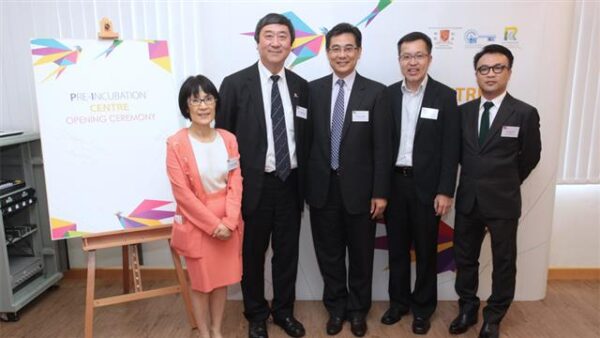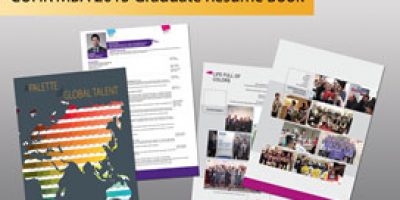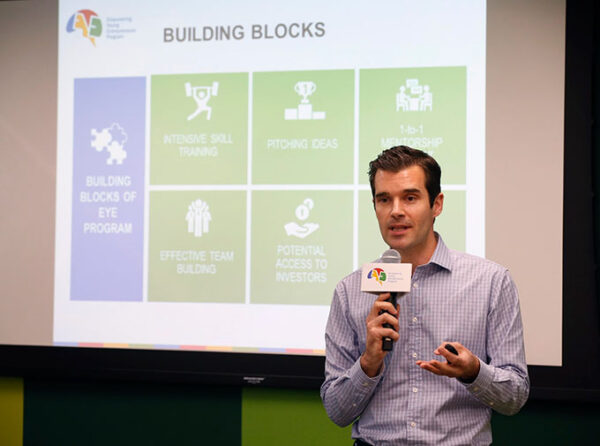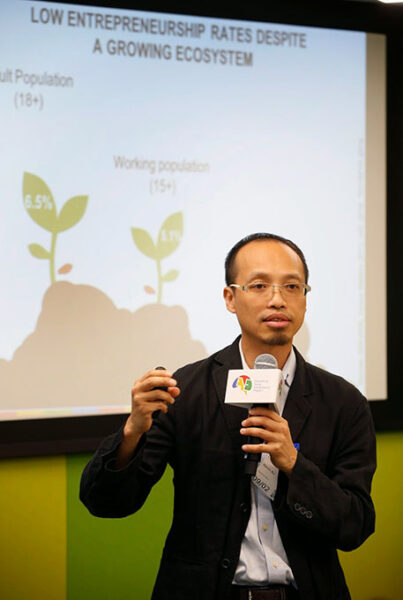Mr. Charles Li Generates Strong Enthusiasm at Global Leader Series Talk
The Global Leader Series held on 18 November drew a full house of over 300 attendees to fill the Grand Ballroom of New World Millennium Hong Kong Hotel in Tsimshatsui. Before a diverse and captivated audience, guest speaker Mr. Charles Li, Chief Executive of Hong Kong Exchanges and Clearing Limited, shared his insights and timely […]
The Global Leader Series held on 18 November drew a full house of over 300 attendees to fill the Grand Ballroom of New World Millennium Hong Kong Hotel in Tsimshatsui. Before a diverse and captivated audience, guest speaker Mr. Charles Li, Chief Executive of Hong Kong Exchanges and Clearing Limited, shared his insights and timely analysis of the ‘Shanghai-Hong Kong Stock Connect’, a topic that highly interested everyone.
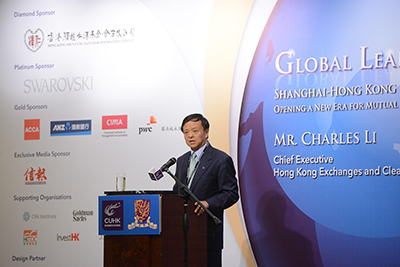
The influential speaker Mr. Charles Li addresses the timely topic of ‘Shanghai-Hong Kong Stock Connect’
The Global Leader Series connects an international audience through an inspiring lecture coupled with a networking reception. This high-profile talk was hosted by CUHK Pro-Vice-Chancellor Prof. Michael Hui and the new dean of the CUHK Business School Prof. Kalok Chan. “As the new dean of the Business School, it is my pleasure to host the Global Leader Series for the first time,” said Prof. Chan. “It is our privilege to have an influential leader such as Mr. Charles Li present an inspiring speech on a timely topic before our distinguished guests, alumni and students.”
Captivated attendees from academic, business and political circles rave about the lecture
Mr. Li addressed the growing relationship between Hong Kong and China and how the respective markets can be further integrated and mutually beneficial. He expressed pleasure with the opportunity to interact with an engaging audience. “I wish to thank the Business School for inviting me to speak to a dynamic group of people at this noteworthy time as the economies of Hong Kong and China grow.” Mr. Li’s keen insights and eloquence riveted all the attendees, who responded with thunderous applause.
The impressive audience covered a mix of academic, economic and political ranks. There were Hong Kong-based diplomats from the Consulates General of Canada, France, Russia, the United Kingdom and the United States. Other eminent business leaders included Mr. Choi Park Lai, Chairman of Shun Lung Yan Chak Foundation Limited; Mr. Simon Galpin, Director General of Investment Promotion of InvestHK; Ms. Leonie Ki, SBS, JP, Executive Director of New World Development Company Limited; Mr. Paul Smith, Managing Director of Asia Pacific at CFA Institute; Mr. Kenneth Kok, Executive Director of Goldman Sachs (Asia) LLC; Mr. David Leahy, Managing Director of Sales and Marketing at JP Morgan; and Mr. Albert Ip, Executive Director and Chief Executive Officer of Langham Hospitality Investments Limited. In addition, our illustrious alumni included Mr. Rayon Chu, Assurance Partner of PwC; Mr. Chan King Cheung, Deputy Publisher and President of Hong Kong Economic Journal Digital; Mr. Lau Sai Yung, Executive Chairman of Union Alpha Group; Ms. Daisy Lee, Head of Human Resources Operations (Non-Racing) of Hong Kong Jockey Club; Mr. Jacky Tsang, Executive Director of Finance and Treasury Division of BOC International Holdings Limited; Dr. Peter So, Managing Director of Securities Research of CCB International Securities Limited; and Mr. Wong Kim Man, Chief Financial Officer of Hong Kong Electric Investments Limited…
Read More >>


